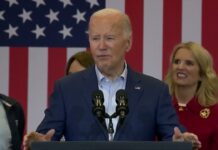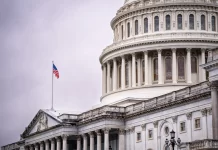WASHINGTON, D.C. – Congresswoman Eleanor Holmes Norton (D-DC) released her opening statement in advance of today’s historic Committee on Oversight and Reform markup and vote on her District of Columbia statehood bill (H.R. 51). The markup begins at 10 a.m. The bill will go to the Rules Committee early next week in the final step before a House floor vote later that week. The bill has 215 cosponsors, virtually guaranteeing House passage of the D.C. statehood bill for only the second time in history.
Norton’s opening statement, as prepared for delivery, is below.
Opening Statement of Congresswoman Eleanor Holmes Norton
House Committee on Oversight and Reform
Markup of H.R. 51, the Washington, D.C. Admission Act
April 14, 2021
Chairwoman Maloney, the 712,000 District of Columbia residents and I thank you for holding this markup so early in this session, which will allow the House to vote on H.R. 51 next week. This markup could not be more timely. Tomorrow is the traditional federal tax filing deadline, and Friday is Emancipation Day, which celebrates the freeing of 3,100 enslaved persons in D.C. in 1862. These two days remind us that D.C. residents are taxed without voting representation in Congress and are denied equal political rights.
Last year, the House passed H.R. 51, which was the first time in history a chamber had passed the D.C. statehood bill. This year, H.R. 51 has 215 cosponsors, virtually guaranteeing House passage next week. The Senate version of the bill, S. 51, sponsored by Senator Tom Carper, has a record 44 cosponsors. With Democrats controlling the House, the Senate and the White House, we have never been closer to statehood.
Congress has both the constitutional authority and moral obligation to pass H.R. 51. The Constitution gives Congress the authority to admit new states, which it has done 37 times, and to reduce the size of the federal district, which it did by 30 percent in 1846. This country was founded on the principles of no taxation without representation and consent of the governed, but the United States is the only democratic country that denies voting representation in the national legislature to the residents of the capital.
Under H.R. 51, the State of Washington, D.C. would consist of 66 of the 68 square miles of the present-day federal district. The reduced federal district, over which Congress would retain plenary authority, would be two square miles and consist of the Washington that people associate with the nation’s capital, including the U.S. Capitol complex, the White House, the Supreme Court, the principal federal monuments and the National Mall.
H.R. 51 has both the Constitution and facts on its side. The Constitution’s Admissions Clause gives Congress the authority to admit new states, but a new state may not be created from an existing state without the existing state’s consent. The State of Washington, D.C. would be created from land ceded by the federal government, not an existing state.
The Constitution’s District Clause gives Congress plenary authority over the federal district and establishes a maximum size of the federal district—100 square miles. It does not establish a minimum size or a location of the federal district.
The 23rd Amendment to the Constitution, which allows the federal district to participate in the Electoral College, also does not establish a minimum size or a location of the federal district.
While the Constitution does not establish any prerequisites for new states, Congress generally has considered three elements in admission decisions: population and resources, support for statehood and commitment to democracy. Although D.C. does have car dealerships, notably, the Framers left car dealerships out of the Admissions Clause, and, until last month’s hearing on H.R. 51, the number of car dealerships had never been raised as an element in admission decisions.
D.C.’s population is larger than two states, and the State of Washington, D.C. would be one of seven states with a population under one million. D.C. pays more federal taxes per capita than any state and pays more federal taxes than 21 states. D.C. has a gross domestic product larger than 17 states. D.C.’s bond rating is higher than the rating of 32 states.
In 2016, 86 percent of D.C. residents voted for statehood. D.C. residents have been petitioning for voting rights in Congress and local autonomy for 220 years.
As American citizens, D.C. residents are entitled to equal citizenship, but they have also earned it. They have fought in every American war, including the war that led to the creation of the nation, the Revolutionary War. D.C. servicemembers have helped get voting rights for people throughout the world, yet have always been denied those same rights when they returned home.
My own family has lived in D.C. since my great-grandfather Richard Holmes, as a slave, walked away from a plantation in Virginia and made his way to D.C. almost 200 years ago. Richard Holmes made it as far as D.C., a walk to freedom but not to equal citizenship so far for our family.
Congress can no longer exclude D.C. residents from the democratic process, forcing residents to watch from the sidelines as Congress votes on laws that affect the nation or votes even on the laws of the duly elected D.C. government. Democracy requires much more. D.C. residents demand much more. D.C. residents deserve full voting representation in the Senate and the House and complete control over their local affairs. They deserve statehood.
Congress can continue to exercise autocratic authority over the American citizens who reside in our nation’s capital, treating them, in the words of Frederick Douglass, the inspiration for the name of the new state, as “aliens, not citizens, but subjects.” Or it can live up to the nation’s promise and ideals, end taxation without representation and pass H.R. 51.
Madam Chairwoman, thank you again for your leadership on D.C. statehood.
###













































